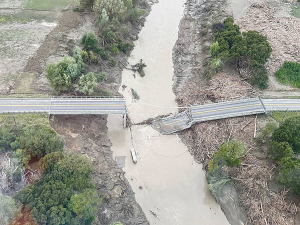Editorial: Time for a reset
OPINION: The Government's recent announcement that methane targets will be reviewed is bringing relief to farmers.
 Tony Orman argues that natural climate cycles with warming and cooling and extreme weather events have always been. Photo Credit: Chorus.
Tony Orman argues that natural climate cycles with warming and cooling and extreme weather events have always been. Photo Credit: Chorus.
OPINION: Leo Cooney's opinion article (December 5) “Carbon Credits a Discredit” rekindled for me questions about climate change, the ETS, and indeed the whole matter of climate change formerly known as global warming.
There is much confusion as to distinguishing the actual man-induced impact.
I have pondered why the term “global warming” reverted to “climate change”? That in itself is confusing. Climate change has always been happening in cyclic fashion.
There’s scientific evidence.
In scientist George Gibbs’ comprehensive and fascinating book Ghosts of Gondwana the astonishing revelation that about 15 to 20 million years ago, in Central Otago, there was a large freshwater lake ecosystem that by evidence of fossils, had crocodiles, turtles, eucalyptus trees and other warm species. “Their presence is indicative of a sub-tropical dry climate,” wrote Gibbs.
The climate must have warmed to allow sub-tropical species to not only exist but thrive. Then it cooled to its present day climate of cold winters and hot summers – again proof of the dynamics of climate change.
There have always been periods of climate change – warming and cooling.
In the 1980s a hydrologist/ botanist Dr Patrick Grant chanced upon early missionary-explorer William Colenso’s observations of the Ruahine Range in the 1840s. Grant was intrigued.
Catchment boards and extreme green groups like Forest and Bird had long blamed the “extensive land slips” and “creek beds choked with dead trees and masses of stone” on wild deer. But Colenso’s diaries clearly showed the land slips and choked stream beds had been there decades before the first deer were liberated.
So, Grant set about researching the causes. The clue was in climate. By 1985, he had defined at least seven periods of accelerated erosion since the great Taupo eruption 1800 years ago.”
The warm periods are often accompanied by severe storms such as Cyclone Alison (1975) and Cyclone Bola (1988). In the Pohangina saddle in the Ruahine Ranges, during Cyclone Allison, a rainfall gauge recorded a 24 hour rainfall of 400mm (16 inches).
William Colenso’s diaries testify tropical cyclones and extreme weather events are by no means a recent phenomenon.
Grant wrote in his book Hawke’s Bay Forests of Yesteryear, published 1996, that the erosion Colenso saw in the 1840s “was no doubt the effects of gales and heavy rainfalls.”
He scientifically identified eight “warm erosion” periods stretching back to 350-450 AD. Between warm erosion periods generally being 50 to 100 years each, “are cooler, tranquil intervals.”
So much for tropical Cyclone Gabrielle. Perhaps it was just another of many, over many centuries? Natural climate cycles with warming and cooling and extreme weather events have always been.
The problem I have with the current alarm calls being sounded about climate change is the lack of distinguishing between natural climate change and human induced climate change.
In his article Leo Cooney wrote “the so-called experts are only taking selective sequestration of carbon into their equation” and went on to add “if all sequestration was measured, such as from all our plants - including pasture.”
Bizarrely, the government’s Emissions Trading Scheme (ETS) ignores the carbon sequestering value of pasture and in a bizarre, illogical rule, any trees or shrubs under 5 metres tall are excluded from sequestering calculations. Yet many native plants are, even at maturity, under 5 metres in height.
Tony Orman is a Marlborough-based agricultural journalist and has had some two dozen books published on trout fishing, deerstalking and conservation.
Bankers have been making record profits in the last few years, but those aren’t the only records they’ve been breaking, says Federated Farmers vice president Richard McIntyre.
The 2023-24 season has been a roller coaster ride for Waikato dairy farmers, according to Federated Farmers dairy section chair, Mathew Zonderop.
Ministry for Primary Industries (MPI) director general Ray Smith says job cuts announced this morning will not impact the way the Ministry is organised or merge business units.
Scales Corporation is acquiring a number of orchard assets from Bostock Group.
Family and solidarity shone through at the 75 years of Ferdon sale in Otorohanga last month.
The Ministry for Primary Industries (MPI) has informed staff it will cut 391 jobs following a consultation period.

OPINION: This old mutt well remembers the wailing, whining and gnashing of teeth by former West Coast MP and Labour…
OPINION: Your canine crusader gets a little fed up with the some in media, union hacks, opposition politicians and hard-core…